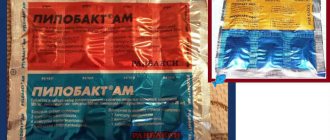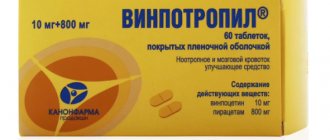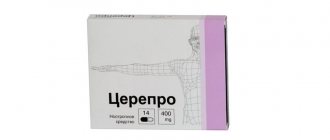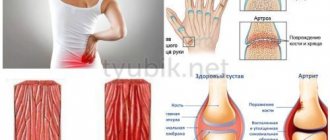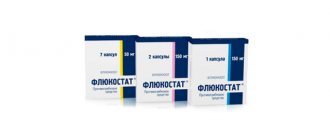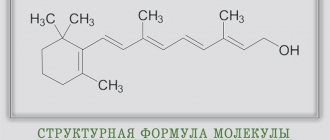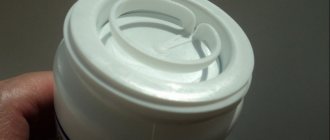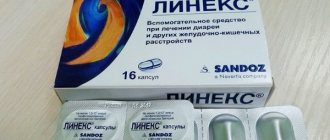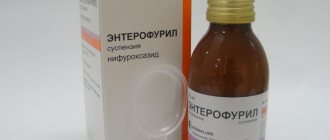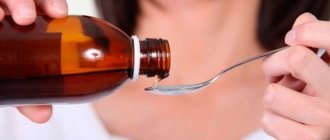Synonyms: Memoria
The homeopathic remedy Memoria has a beneficial effect on memory and blood circulation in the brain. This drug increases brain metabolism and also has a nosotropic effect, increases vascular elasticity, and enriches blood, cells and tissues with oxygen. It is very effective in cases of strong mental stress, increases concentration and has a positive effect on learning ability. Memoria has a good effect on the recovery of the body after traumatic brain injury and concussion, especially if the patient is in a state of prostration. The homeopathic remedy slows down age-related changes and has a positive effect on the emotional state of the patient.
Pharmacodynamics and pharmacokinetics
Pharmacodynamics
Memoria has a complex effect on brain metabolism . The drug improves hemodynamics and oxygen supply to all brain tissues, relieves vascular spasms, normalizes the metabolic process and the energy potential of nervous system cells, improves blood circulation in the vessels of the eyes and brain.
Affects the process of platelet aggregation, improves membrane-stabilizing properties , which enhances the strength and elasticity of blood vessels. As a result, the symptoms of cerebral circulation disorders that develop against the background of trauma to brain structures are quickly relieved - headaches, tinnitus, head noise, frequent dizziness, irritability, anxiety, emotional lability, asthenia, depressive symptoms .
The drug improves memory , concentration during mental work, associative processes, increases ability to work and the speed of psychomotor reactions. Memoria increases learning ability, restores clarity of consciousness, and slows down the development of age-related changes in brain structures.
Pharmacokinetics
Data not provided.
Description of pharmacological action
Ginkgo biloba extract improves the supply of oxygen and glucose to the brain. The active substances of this extract are flavone glycosides, ginkgolides and bilobalides. They dilate blood vessels, improve blood flow, prevent platelet clumping and, by regulating metabolism, protect cells and tissues from damage caused by oxygen deficiency. The drug improves blood circulation and metabolism in the brain and prevents deterioration of mental activity, improves blood circulation in the end, reduces the feeling of cold, tingling, numbness and pain when walking.
Indications for use
Memoria is prescribed for the treatment of disorders of brain activity and cerebral circulation, therapy of cerebral atherosclerosis , injuries with damage to brain structures.
The drug is indicated for memory loss , impaired concentration, high intellectual stress, as well as for migraines , dizziness, and headaches.
Lomir
From the cardiovascular system: tachycardia, palpitations, asymptomatic decrease in blood pressure, rarely - excessive decrease in blood pressure, especially unfavorable at night in “dippers” (patients with initially reduced night blood pressure values by 15-20% compared to daytime values) with hypertensive encephalopathy, myocardial ischemia, up to the development of myocardial infarction (especially in patients with coronary atherosclerosis), arrhythmia (including ventricular fibrillation and flutter), development or worsening of heart failure, peripheral edema.
From the digestive system: increased appetite, dry mouth, nausea, gastralgia, increased activity of liver transaminases, rarely - vomiting, constipation or diarrhea, intestinal atony, gum hyperplasia (bleeding, soreness, swelling).
From the nervous system: dizziness, headache, paresthesia, increased fatigue, asthenia, convulsions, extrapyramidal (parkinsonian) disorders (ataxia, mask-like face, shuffling gait, stiffness of the arms or legs, trembling of the hands and fingers, difficulty swallowing), depression, drowsiness.
Allergic reactions: skin rash, “flushes” of blood to the facial skin, a feeling of heat in the face, flushing of the facial skin, arthritis (pain and swelling of the joints, increased titer of antinuclear bodies).
Other: cough, atony of the bladder, increased sweating, accommodation paresis, transient loss of vision, rarely - agranulocytosis, pulmonary edema (difficulty breathing, cough, wheezing), galactorrhea, thrombocytopenia (asymptomatic), weight gain. Overdose. Symptoms: excessive decrease in blood pressure, severe bradycardia, heart failure, cardiogenic shock, asystole, tachycardia.
Treatment: gastric lavage, artificial vomiting, activated charcoal. For bradycardia - atropine (0.6-1 mg), isoprenaline; in case of severe bradycardia, electrical stimulation can be used; for heart failure - dopamine, dobutamine, diuretics, strophanthin; with a decrease in blood pressure - vasopressors; for ventricular tachycardia in patients with anterograde conduction during atrial flutter and fibrillation and with additional conduction bundles in WPW syndrome or Lown-Ganong-Levine syndrome - direct electrical pulse therapy, intravenous administration of lidocaine, procainamide, slow drip administration of infusion solutions; symptomatic therapy (monitoring the state of vital functions of the body). Hemodialysis and peritoneal dialysis are ineffective.
Instructions for Memoria (Method and dosage)
The drug is prescribed to adults and adolescents, 10 drops orally 3 times a day. Memoria drops are taken half an hour before or 1 hour after meals in their natural form, or the drops are diluted in a tablespoon of water. The duration of treatment is 60-90 days. If necessary, a second course of treatment is possible according to indications.
If quick relief of symptoms is required, the drug can be taken 8 drops every 0.5-1 hour, not exceeding eight times a day, and after relief of symptoms, switch to taking it three times a day.
The instructions for use of Memoria recommend holding the drug in your mouth for some time before swallowing the drops, which increases the effectiveness of its action.
Composition of the drug Memoria. Release form
Memoria drops are dark yellow or light yellow in color. The drug does not have a distinct odor and is available in dark glass bottles with a dispenser. Bottles of 20ml, 50ml or 100ml are packed in cardboard boxes with instructions for use.
Memoria tablets are white, sometimes interspersed with gray. Flat, small in size. Blisters are packed in cardboard boxes with instructions.
The composition of the drug Memoria per 100 ml includes the following components:
- St. John's wort (Hypericum) D1 15 ml;
- Ginkgo biloba (Ginkgo) D6 10 ml;
- Spotted hemlock (Conium) D6 10 ml;
- Ginseng D6;
- Mountain arnica (Arnica) D12;
The excipients are:
- Ethanol 43%;
- Purified water.
During storage of the drug, the liquid may become cloudy and a small sediment may appear. The taste and smell of the drops may change. This does not affect the quality of the homeopathic remedy and it can continue to be used.
The drug should be stored at room temperature. The shelf life of Memoria is 5 years.
Interaction
When using the drug, it is necessary to take into account that St. John's wort, which is part of it, can change the effectiveness of the therapeutic effects of a number of drugs: it enhances the antidepressant effect of monoamine oxidase inhibitors .
When used together with Fluoxetine , sertraline , Paroxetine , Citalopram or fluvoxamine :
- complicates hemolytic reactions;
- may enhance the photosensitizing effect of sulfonamides , tetracyclines , Piroxicam , thiazide diuretics ;
- reduces the hypotensive effect of Reserpine ;
- reduces the blood concentration of Digoxin , Cyclosporine and the effectiveness of treatment with indinavir ;
- reduces the effectiveness of anticoagulants ( Phenprokumon , Warfarin ).
Analogues of the drug Memoria
There are no complete analogues of this drug. But there are medicines that are similar in composition and indications for use. You should not replace Memoria with similar products yourself, otherwise the effect may be completely different from what is expected.
Analogues of Memoria include the following drugs:
- Bilobil;
- Neuroximet;
- Tanakan;
- Alcheba;
- Memoplant;
- And others.
Please note that this article is for informational purposes only. You should not prescribe the drug to yourself or your loved ones; any use of the drug, its dosage or replacement with analogues should be discussed with your doctor. Do not self-medicate.
Reviews about Memoria
Reviews about Memoria are favorable. Students leave especially good reviews about the drug, many of whom take a course of treatment once every six months before or during sessions. There is an improvement in memory and concentration, and the material being studied is better remembered.
A good effect is noted by patients suffering from cerebral vascular spasms . A preventive course of treatment in spring and autumn, when there are strong changes in atmospheric pressure, has a good effect on health. After a course of treatment, headaches, tinnitus, and drowsiness disappear. Many people after 40 years of age use it as a preventive measure.
Memoria
Active substance:
Pharmgroup:
Homeopathic remedies
Application area:Secondary disorders of mnestic functions Forgetfulness Difficulty concentrating Difficulty in mental functioning Intellectual disability Intellectual-mnestic disorder Intellectual-mnestic disorder Mental infantilism Cognitive impairment Memory impairment Intellectual impairment Violation of mnestic functions Violation of mental activity Thinking disorder Memory impairment Impaired mental performance Impaired thinking function Thinking disorders Memory disorders Weakening intellectual productivity Memory loss Mental retardation Memory decline Primary disorders of mnestic functions Decreased intellectual-mnestic functions Decreased intellectual productivity Absent-mindedness Thought disorders Thought disorder Sclerosis of cerebral vessels Sclerotic disorders of cerebral circulation Decreased intellectual-mnestic functions Decreased intellectual productivity Decreased intellectual capabilities Decreased intellectual abilities Decreased intellectual abilities in elderly patients Decreased mental function Decreased thinking function Memory loss in old age Decreased mental activity Reduced intellectual level Vascular diseases of the brain Deterioration of intellectual-mnestic functions Memory impairment Decreased memory for recent events Memory impairment in elderly patients Chronic mental impairment |
Memoria price, where to buy
Memoria drops can be purchased in pharmacies in Moscow and other Russian cities. The price of the drug depends on the volume of the bottle. The cost of the drug in a 50 ml bottle ranges from 337 to 420 rubles, and in 20 ml bottles - from 215 rubles. up to 259 rubles.
- Online pharmacies in UkraineUkraine
Pharmacy24
- Memoria 50 ml drops Richard Bittner AG, Austria
194 UAH order - Memoria 20 ml drops Richard Bittner AG, Austria
104 UAH order
Contraindications
Memoria drops are not recommended for children under 12 years of age, but there are cases when a doctor may prescribe a homeopathic remedy. You must strictly adhere to the dosage chosen by the doctor.
If the patient has any liver disease, then it is better to avoid this drug.
Pregnancy and lactation are also contraindications to the use of Memoria, however, in individual cases it can be taken as prescribed by a doctor.
Individual intolerance to certain components of the drug can cause adverse allergic reactions in the body.
